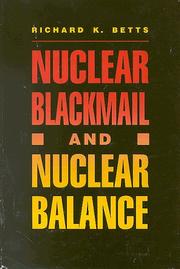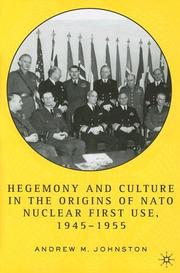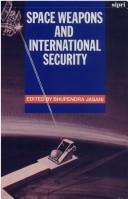| Listing 1 - 10 of 16 | << page >> |
Sort by
|
Book
Year: 1986
Abstract | Keywords | Export | Availability | Bookmark
 Loading...
Loading...Choose an application
- Reference Manager
- EndNote
- RefWorks (Direct export to RefWorks)
Book
Year: 1963 Publisher: Amsterdam London New York Elseitzer Publishing Cy
Abstract | Keywords | Export | Availability | Bookmark
 Loading...
Loading...Choose an application
- Reference Manager
- EndNote
- RefWorks (Direct export to RefWorks)
Guerre atomique --- Sciences appliquées --- 623.454.9 : 616-001.265
Book
ISBN: 0393019950 Year: 1985 Publisher: New York Norton
Abstract | Keywords | Export | Availability | Bookmark
 Loading...
Loading...Choose an application
- Reference Manager
- EndNote
- RefWorks (Direct export to RefWorks)
Atoomoorlog --- Désarmement nucléaire --- Guerre atomique --- Guerre nucléaire --- Kernoorlog --- Nucleaire ontwapening --- Nucleaire oorlog --- Nuclear disarmament --- Nuclear warfare --- Nuclear disarmament. --- Nuclear warfare.

ISBN: 0815709358 Year: 1987 Publisher: Washington, D.C. The Brookings Institution
Abstract | Keywords | Export | Availability | Bookmark
 Loading...
Loading...Choose an application
- Reference Manager
- EndNote
- RefWorks (Direct export to RefWorks)
Polemology --- Atoomoorlog --- Guerre atomique --- Guerre nucléaire --- Kernoorlog --- Nucleaire oorlog --- Nuclear warfare --- Military history, Modern --- Nuclear warfare. --- World politics --- 1945 --- -Military history [Modern ] --- 20th century
Book
ISBN: 0803902824 9780803902824 Year: 1973 Volume: 9 Publisher: Beverly Hills ; London Sage Publications
Abstract | Keywords | Export | Availability | Bookmark
 Loading...
Loading...Choose an application
- Reference Manager
- EndNote
- RefWorks (Direct export to RefWorks)
Atoomoorlog --- Guerre atomique --- Guerre nucléaire --- Kernoorlog --- Nucleaire oorlog --- Nuclear warfare --- United States --- France --- Europe --- Great Britain --- Military policy --- Defenses --- United States - Military policy --- France - Military policy --- Europe - Defenses --- Great Britain - Military policy
Book
ISBN: 0803915241 0803915233 9780803915244 9780803915237 Year: 1981 Volume: 117 Publisher: Beverly Hills London Sage Publications
Abstract | Keywords | Export | Availability | Bookmark
 Loading...
Loading...Choose an application
- Reference Manager
- EndNote
- RefWorks (Direct export to RefWorks)
Atoomoorlog --- Guerre --- Guerre atomique --- Guerre nucléaire --- Kernoorlog --- Nucleaire oorlog --- Nuclear warfare --- Oorlog --- Polemologie --- Polémologie --- War --- Nuclear warfare. --- War. --- World politics --- 1945 --- -Nuclear warfare --- -Nuclear warfare. --- World politics - 1945-1989.

ISBN: 1403970246 134953188X 9786611367770 128136777X 1403976937 Year: 2005 Publisher: New York ; Basingstoke Palgrave Macmillan
Abstract | Keywords | Export | Availability | Bookmark
 Loading...
Loading...Choose an application
- Reference Manager
- EndNote
- RefWorks (Direct export to RefWorks)
Johnston argues that the preemptive first-use of nuclear weapons, long the foundation of American nuclear strategy, was not the carefully reasoned response to a growing Soviet conventional threat. Instead, it was part of a process of cultural 'socialization', by which the United States reconstituted the previously nationalist strategic cultures of the European allies into a seamless western community directed by Washington. Building a bridge between theory and practice, this book examines the usefulness of cultural theory in international history.
Afschrikking (Strategie) --- Atoomoorlog --- Deterrence (Strategy) --- Dissuasion (Stratégie) --- Guerre atomique --- Guerre nucléaire --- Kernoorlog --- Nucleaire oorlog --- Nuclear warfare --- North Atlantic Treaty Organization --- Military policy --- Nuclear weapons --- Europe --- International relations. --- Politics and war. --- International Relations. --- Military and Defence Studies.

ISBN: 0198291027 Year: 1987 Publisher: Oxford University Press
Abstract | Keywords | Export | Availability | Bookmark
 Loading...
Loading...Choose an application
- Reference Manager
- EndNote
- RefWorks (Direct export to RefWorks)
International relations. Foreign policy --- Polemology --- internationale betrekkingen --- Space warfare --- Ballistic missile defenses --- Space weapons --- Nuclear warfare --- Security, International --- Guerre spatiale --- Défense antimissile --- Armes spatiales --- Guerre nucléaire --- Sécurité internationale --- Défense antimissile --- Guerre nucléaire --- Sécurité internationale --- Veiligheid (Internationale). --- Atoomoorlog --- Armes spatiales. --- Sécurité internationale. --- Guerre atomique --- Ruimtewapens.

ISBN: 0803939418 080393940X 9780803939417 Year: 1990 Volume: vol *2 Publisher: Newbury Park, California ; London ; New Delhi : Sage Publications,
Abstract | Keywords | Export | Availability | Bookmark
 Loading...
Loading...Choose an application
- Reference Manager
- EndNote
- RefWorks (Direct export to RefWorks)
This is an original contribution to the literature on how psychological factors influence the origins, processes and consequences of conventional and possibly nuclear war. The scope is broad, ranging from human aggression to the psychological dilemmas of deterrence. It will be of interest to professionals and advanced students in international relations and political science. Traditionally scholars of the international political system have assumed that wars serve national interests and that such decisions are based on rational means/ends calculations. Yet even political realists such as Hans J. Morgenthau have admitted that psychological analysis might shed further light on how nations behave. Psychological Dimensions of War analyzes how psychological factors influence the origins, processes, and consequences of conventional, and possibly nuclear, war. This original and thought-provoking volume brings together leading scholars, including Anatol Rapoport and George Quester, who analyze the psychology of both motivated and unmotivated biases of war behavior. With depth and insight, the contributors explore the interaction between political and psychological factors of war and use psychological variables to explain how emotions may have constructive as well as destructive results. In Part I the contributors analyze the biological, psychological, and ideological factors that are predispositions to war and in Part II they analyze the problems that governmental leaders encounter when managing contemporary, limited warfare. In Part III the contributors explore the factors that are most likely to lead to a nuclear conflict. An innovative contribution to the literature, Psychological Dimensions of War will interest professionals and advanced students in international relations, political science, peace studies, and psychology. "Over the past thirty years, such analyses [of foreign policy decisions which lead to war or peace] have emphasized, among other things, situational variables (e.g., crises), contextual variables (e.g., the organizational setting), perceptions of various sorts, and basic personality characteristics. This interesting book covers all these approaches to understanding the impact of psychological factors in war/peace decisions and ranges considerably beyond." --Perspectives on Political Science "Glad is to be congratulated for putting together a stimulating and enlightening collection of papers. . . .She (has) done a skillful job of editing, providing useful commentary on the various sections."
Atoomoorlog --- Guerre atomique --- Guerre nucléaire --- Kernoorlog --- Nucleaire oorlog --- Nuclear warfare --- Psychologie [Militaire ] --- Psychologie militaire --- Psychology [Military ] --- War --- Psychology, Military. --- Military history, Modern --- Nuclear warfare. --- Psychological aspects. --- Histoire militaire --- Psychologie militaire. --- Guerre --- Aspect psychologique. --- Psychological aspects --- Military history [Modern ] --- 20th century --- War - Psychological aspects. --- Military history, Modern - 20th century. --- Aspect psychologique

ISBN: 0394525590 9780394525594 Year: 1982 Publisher: New York Knopf
Abstract | Keywords | Export | Availability | Bookmark
 Loading...
Loading...Choose an application
- Reference Manager
- EndNote
- RefWorks (Direct export to RefWorks)
Atoomoorlog --- Guerre atomique --- Guerre nucléaire --- Kernoorlog --- Nucleaire oorlog --- Nuclear warfare --- Nuclear warfare. --- 502.5 --- 623.454.8 --- Atomic warfare --- CBR warfare --- Nuclear strategy --- Nuclear war --- Thermonuclear warfare --- War --- Nuclear crisis control --- Nuclear weapons --- The nature complex as a whole. Balance. Danger. Damage. Threat of destruction --- 502.5 The nature complex as a whole. Balance. Danger. Damage. Threat of destruction
| Listing 1 - 10 of 16 | << page >> |
Sort by
|

 Search
Search Feedback
Feedback About
About Help
Help News
News